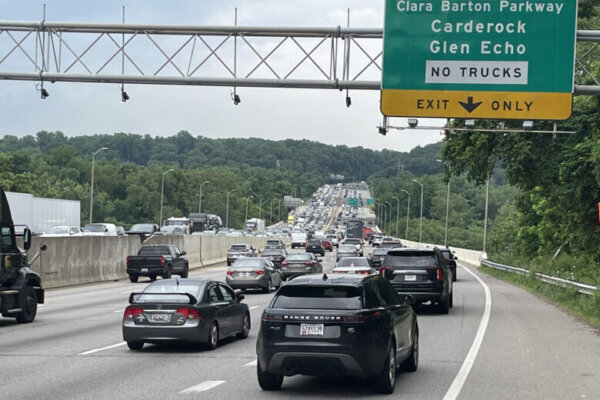This article was republished with permission from WTOP’s news partners at Maryland Matters. Sign up for Maryland Matters’ free email subscription today.
This content was republished with permission from WTOP’s news partners at Maryland Matters. Sign up for Maryland Matters’ free email subscription today.

A key federal agency has delayed Maryland’s plan to build toll lanes on the Capital Beltway and I-270, the latest setback for the star-crossed project.
The move was immediately criticized by Gov. Larry Hogan (R), who said the delay will imperil the state’s efforts to ease one of the nation’s worst bottlenecks. The term-limited executive, who is set to leave office in January, conceded the delay could push the $7.6 billion project, which he launched nearly five years ago, beyond his term in office.
Hogan sent a letter to President Joe Biden and Transportation Secretary Pete Buttigieg, urging them to reverse the Federal Highway Administration’s decision. He said the state is “prepared to use every tool at our disposal — up to and including legal action.”
A spokesperson for the agency said late Friday there is no estimate for when a final decision will be issued.
In a statement, a Federal Highway Administration spokesperson said the agency is “continuing to work with the Maryland Department of Transportation on the I-495/I-270 Managed Lanes Study.”
“There have been strong feelings about this project and it is FHWA’s responsibility not to pick a side, but to ensure that the [National Environmental Policy Act] process is followed with integrity,” the spokesperson added. “This includes completing a thorough review of comments received to ensure public feedback is adequately addressed as we work toward finalizing a Record of Decision for this project.”
Hogan said Maryland was “completely blindsided” by the move and he accused acting Federal Highway Administrator Stephanie Pollack of issuing a “rogue” decision against the recommendations of agency staff.
“There was no logic to it,” he said in an interview. “No substance to it.”
The agency statement did not address Hogan’s allegations.
The governor said the state had been led to believe that the agency was poised to approve the project. The Federal Highway Administration had been expected to issue its final verdict on the plan — known as a “record of decision” — on Friday.
Late in the week, however, Maryland Transportation Secretary Jim Ports was notified that a decision was being put off. As of Friday afternoon, a federal dashboard that tracks large infrastructure projects still listed Aug. 5 as the “target date.”
In the interview, Hogan called the delay “outrageous and shocking.”
Hogan unveiled his plan to add four “express lanes” — two in each direction — to the entire length of I-270, the Maryland side of the Beltway, and the federally owned Baltimore-Washington Parkway five years ago.
It immediately encountered pushback from some nearby residents. It also drew condemnation from environmentalists, transit advocates and local leaders. Pointing to the sometimes eye-popping tolls that Virginia motorists pay, some critics maintained that only upper-income people would derive benefit from the new lanes.
The governor shrunk and retooled his plan — boosting transit, allowing transit vehicles to use toll lanes free of charge, and adding a biker/pedestrian path. Some of the steps came in response to pleas from local leaders; some were intended to win over Comptroller Peter Franchot (D), a member of the Board of Public Works whose support Hogan needed to move the project forward.
Hogan remains eager to get a signed contract with Accelerate Maryland Partners, a consortium that includes Virginia’s toll road operator Transurban, before he leaves office in January. He acknowledged in the interview that it’s “certainly possible” that he will run out of time.
Pressure on the feds to delay a decision increased in the weeks that followed the June release of a 26,000-page Final Environmental Impact Statement.
In June, Montgomery County Executive Marc Elrich (D), urged that a final decision on the project be delayed to give people more time to read the report.
Shortly thereafter, transit advocate Ben Ross pressed the U.S. Department of Transportation to look into “possible scientific fraud,” after he said he found unexplained changes in the traffic models the state used to determine how much time motorists would save by using toll lanes.
Earlier this week the head of the Maryland-National Capital Park and Planning Commission urged the U.S. to delay action, claiming that the state skipped a review process mandated by state law.
Hogan told Maryland Matters the various delays had added 20% to the project’s cost. And he pledged to continue his pressure campaign on the Biden administration and federal transportation officials to “immediately” rescind their delay. He expressed cautious optimism that they will do so.
“They’ve been in touch with us since we put out our statement,” he said. “We did light a fire them today, that’s for sure.”
“[W]e’ve gone over and above all of the required processes,” he added. “And over and over and over again, we’ve scaled down the project. Added things. Everything that everybody wanted to do. And now it’s finalized and ready to go.”
Maryland Matters Editor Danielle E. Gaines contributed to this report.







